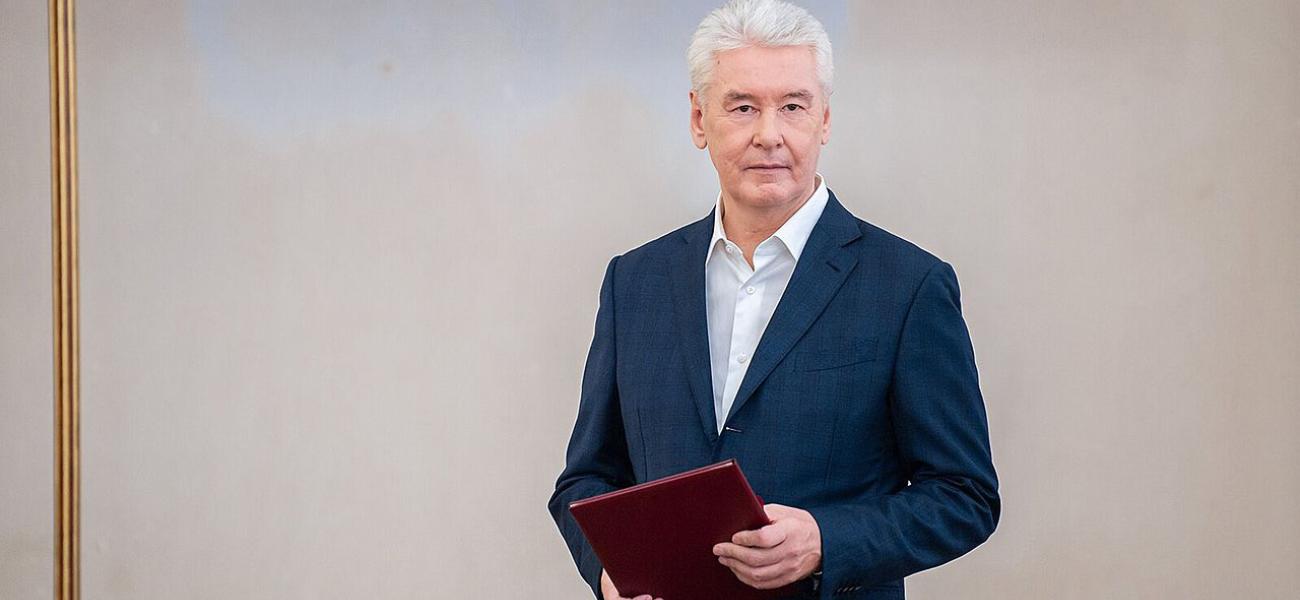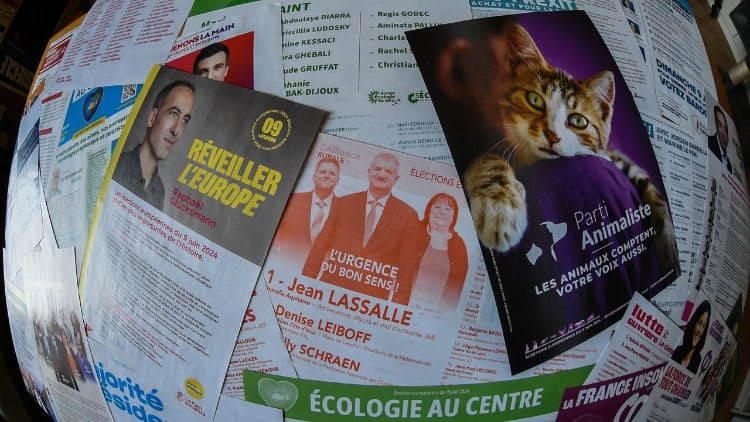
Moscow’s Loyal Mayor: Sergei Sobyanin’s Views on Russia, Ukraine and More
Russian President Vladimir Putin’s post-inaugural reshuffles have created ripples in the pool of potential successors. Promoted to the rank of a vice premier, Dmitry Patrushev, son of ex-secretary of the Security Council Nikolai Patrushev, has been highlighted as a contender, as has Aleksey Dyumin, whom Putin has just made his assistant responsible for Russia’s sprawling defense industry. But there is one more contender whose experience and political savviness is superior to that of Dyumin’s and the younger Patrushev’s combined: Sergei Sobyanin. Sobyanin has been among the list of speculative successors for some time, with St. Petersburg think tank Peterburgskaya Politika once ranking him as the second most likely individual to follow Putin, behind Dmitry Medvedev and before Dyumin.
Born in what is now Russia’s Tyumen region on June 21, 1958, Sobyanin studied mechanics in Kostroma and then worked at a plant in Chelyabinsk before serving in various positions in regional and federal government. In 2001, Sobyanin was elected to his first major political position as the governor of his home Tyumen region. From Nov. 14, 2005, to May 7, 2008, he served as the Head of the Presidential Administration for Putin, and was also a permanent member of the Security Council from 2005 to 2010. Since May 2008, Sobyanin served as Deputy Chairman of the Government of the Russian Federation - Chief of Staff. Sobyanin was then appointed mayor of Moscow in October 2010 after the scandalous removal of Yuri Luzhkov from this post. This decision, made during Dmitry Medvedev’s presidency, was at the time attributed to Sobyanin’s loyalty to Putin as well as to his political expertise. Sobyanin has since been re-elected to the position of mayor in 2013, 2018 and most recently in 2023. He has continued to feature in various lists of Putin’s successors compiled both in Russia and abroad. In no small part, this has been a result of Sobyanin’s ability to toe whatever lines Putin has set on key aspects of Russia’s internal policies while staying mum on some of the tricky-to-navigate external policies (Russia’s war in Ukraine being one exception).
This compilation is meant as a categorized sampling of Sobyanin’s views on issues that impact either vital or important U.S. interests. All sections may be updated with new or past statements. The quotes below are divided into categories similar to those in Russia Matters’ news and analysis digests, reflecting the most pertinent topic areas for U.S.-Russian relations broadly and for drivers of the two countries’ policies toward one another.
Bulleted text that is not italicized, bracketed or in parentheses is a direct quote from Sobyanin.
I. U.S. and Russian priorities for the bilateral agenda
Nuclear security and safety:
- Following 2010 visit to India: We are developing an agreement between our countries on cooperation in the field of peaceful uses of nuclear energy, we have already initialed this agreement and I am sure that it will be signed during Vladimir Putin’s visit to India. … Moreover, I hope that contracts will be signed in the near future for the construction of two more power units at the Kudankulam nuclear power plant with Russian participation. (RIA Novosti, 02.15.10)
North Korea’s nuclear and missile programs:
- No significant developments.
Iran and its nuclear program:
- No significant developments.
Humanitarian impact of the Ukraine conflict:
- The websites of restaurants, shops, hotels and other enterprises that did not support calls in favor of Ukraine are flooded with threats, fakes and complaints. Managers and owners of enterprises are subjected to nightmares, threats of violence and murder. … I must tell you that we will do everything necessary—we will ensure the normal functioning of the city and protect Muscovites. (Sobyanin personal blog, 03.01.22)
- To Putin, on Russia’s “special military operation” in Ukraine: We understand that this is a forced [decision], but in fact [it is] the only solution to ensure the safety of not only the residents of the DPR and LPR, but also Russia itself, its security, its future. (Alekseevsky District News, 03.16.22)
- In a speech on the anniversary of the annexation of Crimea: Happy Crimean Spring, happy holiday of the new Russia, which does not abandon its own, protects its brothers and sisters, uncompromisingly defends its interests and its citizens ... which is worthy of the memory of its ancestors, worthy of its great history. Thank you, friends, for being gathered here today; thanks to the millions of citizens who are with us in heart and soul; thanks to the guys who are defending the citizens of Donbas, Russian citizens, Russia—half the world is up in arms against us, but Russia is a strong country, with its citizens, our patriots, and as long as we are together, we are invincible (TASS, 03.18.22)
- In signing a cooperation agreement between Moscow and the DNR: One of the tasks is assistance in the social sphere, healthcare, education, social support and culture. I hope that together with the Donetsk People's Republic we will actively work on all these areas. Already today, a Moscow team is working in Donetsk—about 300 people, about 100 units of equipment, which is restoring reserve water pipelines in order to provide Donetsk with water. The team provides the inspection of facilities, preparation of project documentation in order to begin the restoration of Donetsk facilities at the first opportunity. (Channel 1, 06.17.22)
- At a meeting with activists of the South-Eastern District, the question was asked: will the city continue to provide support to veterans and members of their families after the end of the SVO? The short answer is yes, we will maintain all the recently introduced support measures. (Sobyanin’s personal blog, 07.06.23)
- On Moscow municipal authorities threatening to revoke contracts with construction firms if they do not meet quotas for recruiting volunteers to work in Ukraine: “It is likely that this measure has at least tacit approval from Moscow Mayor Sergei Sobyanin. This continues his track record of trying to minimize the impact of the conflict on wealthier Muscovites, while at the same time supporting the war effort,” the British Ministry of Defense notes. (RBC, 07.11.23)
- Today we mourn together with the residents of the Luhansk People’s Republic. The brutal and senseless attack by the Ukrainian authorities claimed the lives of dozens of civilians. On behalf of Muscovites and on my own behalf, I express my deepest condolences to the families and friends of the victims. Strength and speedy recovery to those injured. (Telegram, 02.04.24)
Military aspects of the Ukraine conflict and their impacts:
- Mobilization has become a huge test for thousands of Moscow families, whose fathers, husbands and sons are now joining the active army. Nevertheless, the task of partial mobilization became possible primarily thanks to the responsibility, sense of duty and patriotism of Muscovites. (Sobyanin’s personal blog, 10.17.22)
- Thousands of city workers work on the line. Today I visited the place. I talked to construction workers and military personnel. Met soldiers mobilized from Moscow. The spirit is set to fight. (Telegram, 12.02.22)
- Last year, we built the largest and most powerful defense line for our military in the special operation zone. This year, a lot has been done to defend Moscow from drones and terror attacks, which the Ukrainian government has been staging on almost a daily basis. (TASS, 08.31.23)
- We are actively helping our soldiers who are on the front line. We really, almost every day, protect, together with the Russian Armed Forces, the security of our skies over Moscow. (Interfax, 09.18.23)
- Today is a day whose significance for our country and people is difficult to overestimate: 10 years ago, Crimea and Sevastopol were reunited with Russia. This date has become a symbol of the restoration of historical justice. … Participants in a special military operation are now courageously fighting for our right to a peaceful and free life. I am sure that Russia and all of us, together, will do everything to make the dreams and hopes of our people come true. The truth is on our side. It is important to remember that together we will win. Happy Crimean Spring, friends! (Telegram, 03.18.24)
Punitive measures related to Russia’s war against Ukraine and their impact globally:
- On sanctions: In the West, Russia was not loved at all times, but they could not come up with such lists even in the worst periods of history. Such measures do not split, but unite. They lead to results opposite to what the authors were striving for. (RIA Novosti, 01.30.18)
- Regarding his inclusion in U.S. sanctions lists: The entire political and economic elite of the country was carefully included in the Kremlin report. It would be very strange if the mayor of the capital were not included. (RBC, 01.30.18)
- When we plan our investments, government investments, government support, we must understand that we will not get any super-effective story there. We must engage in government support for key areas where we see danger: microelectronics, automotive industry, space technologies, satellite technologies, unmanned technologies. (RBC, 09.28.23)
- We cannot live in peace, we live in a crisis, and if there is no crisis, then you and I will stagnate, if there are crises, you and I will be reborn and move forward. (RBC, 09.28.23)
Ukraine-related negotiations:
- No significant developments.
Great Power rivalry/new Cold War/NATO-Russia relations:
- In the zone of the special military operation, not only the Ukrainian army is fighting with us. In fact, NATO countries are waging an undeclared war against us. There is a flow of Western weapons, specialists and mercenaries into Ukraine. Everything is being done to strangle Russia with economic sanctions. Under these conditions, I consider the Presidential Decree on partial mobilization to be forced, but timely and absolutely necessary. (Sobyanin’s personal website, 09.21.22)
- A special military operation is being carried out in Ukraine, in fact, there is a war going on there, so why hide it? But we are not fighting with Ukraine, the whole of NATO is behind it. (Moskva24, 12.07.22)
China-Russia: Allied or aligned?
- Economic cooperation is developing actively between our countries and our cities. Moscow accounts for 30% of Chinese-Russian overall trade. (TASS, 05.19.14)
- Tourism has been developing very actively for the last few years, tourist flow from China to Moscow goes up about 40% annually. However, I believe that we have a good deal of opportunities to improve cooperation between our cities. Notably, despite a large trade volume, the amount of direct investments is very insignificant. The overwhelming majority of foreign investments in Moscow are made from European countries. I find it wrong. (TASS, 05.19.14)
- The volume of investments should be well-balanced from different parts of the world, in particular, from China. This task envisages that cooperation between our cities, between businesses in Moscow and Beijing, will reach a new level. (TASS, 05.19.14)
- The main share in the structure of Russian exports to China is made up of raw materials. But today we talked with Chinese businessmen about increasing our cooperation in the scientific and technological sphere. (Skolkovo, 05.22.14)
- In regard to volumes of direct investment from China: This is what my visit to mainland China and Hong Kong was largely dedicated to—in order to help local businesses correct this unfortunate omission. (Skolkovo, 05.22.14)
- To date, not a single case of coronavirus has been detected in Moscow. However, observing the alarming situation in China, we, together with the federal government, are taking additional preventive measures to prevent the infection from entering Moscow. … Starting from Feb. 20 this year, Chinese citizens are prohibited from entering Russia. Nevertheless, Russian citizens continue to return from China to Moscow. In addition, the entry of citizens of other countries who have previously visited China is not excluded. (Sobyanin’s personal blog, 02.20.20)
- Eastern markets, we must understand that they are even tougher. There is already a serious war going on with us there, an economic war. (RBC, 09.28.23)
- [In the East] nobody wants to give technology - neither in the field of mechanical engineering, nor in the field of aircraft manufacturing, nor in the field of microelectronics. (RBC, 09.28.23)
- Our cities [Moscow and Beijing] are united by a long history of relations that have gone through different periods, but have always been very close and warm. At this historical stage, relations between the People's Republic of China and the Russian Federation are at the highest level. This bar was set by our leaders—Russian President Vladimir Vladimirovich Putin and Chinese President Xi Jinping. And, of course, our capital cities must meet the task set by our leaders. And it is very right that you and I have developed a new, more in-depth, meaningful program of cooperation between our cities. (TASS, 06.17.24)
- The Beijing mayor’s office and I have developed a new program of cooperation between our cities. This program covers almost all spheres of life in our cities. These are issues related to the environment, urban planning, transport, educational development, healthcare development and a number of other important issues. I am sure, Mr. Lee, that with your support, this program will give a serious impetus to the development of relations between our cities. (RG.ru, 06.17.24)
Missile defense:
- No significant developments.
Nuclear arms:
- No significant developments.
Counterterrorism:
- On Crocus City Hall terrorist attack: It is no exaggeration to say that the entire city came to the rescue. Almost 400 firefighters and rescuers, more than 140 units of fire-fighting equipment participated in extinguishing the fire in Crocus City Hall. Forty-four ambulance crews and three medical helicopters were sent to the scene of the tragedy. Doctors are doing everything to save lives and speed up the recovery of the victims. … 110 social workers, more than 150 psychologists are in constant contact with the families of the deceased and injured. (Telegram, 03.27.24)
- On Crocus City Hall terrorist attack: The capital's businesses provided enormous assistance — donations, material resources, transportation, and even loan write-offs to the victims. Moscow restaurants and retail outlets sent over 215 million rubles to help the victims and the families of the deceased. Muscovites themselves sent over 20 million rubles to help the victims and the families of the deceased through city charity services. The complete elimination of the consequences of the terrorist attack will take some time. And helping its victims will become our constant concern. (Telegram, 03.27.24)
Conflict in Syria:
- No significant developments.
Cyber security/AI:
- No significant developments.
Energy exports from CIS:
- But we must keep in mind that, after all, the basis of the country’s economy is the oil and gas sector, and neither oil nor gas is produced in Moscow. Here are different investments, different quality. (Official site of the mayor of Moscow, 12.28.13)
Climate change:
- When they say that the existing energy supply scheme for a city like Moscow must change, and we must produce a significant part of the energy from renewable sources—solar energy, wind turbines, I can answer—in order to provide Moscow with wind electricity, the entire Central Federal District must be forced "windmills," and the entire population, all living creatures there should disappear. This is a completely futuristic story. … We will still consume a huge amount of heat and at the same time generate a huge amount of electricity. Therefore, kill [the existing. — Ed.] energy and switching to some alternative sources is irrational. (Roskongress, 10.12.23)
- As for ... the climate agenda and the environmental agenda, then, rather, the further development of this direction lies in the plane of a more efficient generation system for the grid economy, transport and consumers. … Maintaining and creating reliable transport systems in terms of energy delivery, generation and energy efficiency of consumers is the recipe that today gives an absolutely excellent effect. And in the future, despite the growth of the city, the economy and the increase in transport, I am sure that our energy consumption in the city will not increase. (Roskongress, 10.12.23)
U.S.-Russian economic ties:
- Even such apologists of globalization as the USA, China and European countries have begun to understand that the opening markets leads not only to increased profits, but also to stronger competitors. (RG.ru, 09.28.23)
U.S.-Russian relations in general:
- I hope that Donald Trump’s election promises, including those regarding improving relations with Russia, will not turn out to be empty words. (X, 11.09.16)
II. Russia’s domestic policies
Domestic politics, economy and energy:
- I don’t think that a journalist can be free by definition, and our press cannot be free. (Kommersant, 10.18.10)
- I am ready to work in any position they send me to. I may remain the head of the administration [of the Kremlin], or I may not. (RIA Novosti, 03.13.08)
- The lands being annexed to the capital are a golden goose that will lay golden eggs. (Argumenty i fakty, 08.30.11)
- Moscow should develop not for officials, not for making super profits, but for the people. (RIA Novosti, 10.19.11)
- We think: here, the mayor of a commercial business city is doing a good job, or at least we hope that he will do a good job, and we give him a business chance to work. But we treat the commercial business party “United Russia” much worse. And miraculously these two business things come together. (Official site of the mayor of Moscow, 11.02.11)
- I know how to solve many issues, I clearly understand the functioning mechanism of the construction complex, education systems, healthcare and social protection. … In Tyumen, there was not even a storm sewer when I arrived there. The city was considered one of the dirtiest and most poorly maintained in Russia. A lot has changed in four years, but now the picture is completely different. Although Tyumen, of course, is not comparable in scale to Moscow. (72.ru, 11.15.11)
- Any demonstrations and rallies, both in Russia and in the United States and in Europe, must adhere to the rules, and if these rules are violated, the police are obliged to suppress them, otherwise the city will simply plunge into chaos. (United Russia, 12.08.11)
- Those demonstrations that are allowed and take place in the established order are not dispersed by anyone, no one offends them…. But this, in fact, is an axiom from which all civilized countries proceed, and Russia must adhere to the same. (United Russia, 12.08.11)
- In the lead-up to the 2012 Russian presidential election: No one is against rallies or marches if it does not interfere with the lives of city residents. We provide platforms for everyone to speak out. But there will definitely not be a Maidan. We will not allow anyone to pitch any tents in the city. (Interfax, 03.01.12)
- People who don’t speak Russian well, who have a completely different culture, are better off living in their own country. Therefore, we do not welcome their adaptation to Moscow. I believe that most likely these are seasonal workers who, having worked, must go to their families, to their homes, to their countries. (RIA Novosti, 05.30.13)
- As for me personally, regardless of whether I was elected or appointed, I will still work with full dedication. But in general, for Moscow, an elected mayor is, of course, a step forward. A person who was supported by voters, who has a mandate of trust. (RIA Novosti, 05.30.13)
- On Alexei Navalny: This is a person who is truly engaged in public life. (Interfax, 08.26.13)
- Regarding the imprisonment of Navalny: I believe that it is better to give suspended sentences for economic crimes, at least there is the first such precedent. … In general, I believe that this decision [on Navalny] is balanced, although, of course, this is a court decision, first of all. (RIA Novosti, 10.16.13)
- The attitude [of Putin and Volodin] was positive to the fact that I believed that [Alexei] Navalny should participate in the elections. I did not feel that there was any other position. (BBC, 10.21.13)
- The demolition of illegal buildings in Moscow is a clear example of the fact that in Russia the truth, heritage and history of our country are not for sale. You cannot hide behind pieces of property acquired through obvious fraudulent means. (RIA Novosti, 02.10.16)
- On rumors regarding his potential candidacy as prime minister: Firstly, I never discuss rumors. Secondly, you probably yourself know very well that if such rumors appear, it means that with almost 100% probability this will not happen. … Yes, I went through this whole kitchen, and I know what kind of work it is. I have no desire to change my current position. (Vedomosti, 10.23.17)
- Regarding the boycott of 2017 municipal elections: I doubt that any conclusions are needed; we do not live in the times of the CPSU Central Committee. In the end, each resident decides for himself whether to go to municipal elections or not. In my opinion, there was more than enough information about this. (Kommersant, 01.29.18)
- This election differs from the previous ones primarily in that I am running for the last term in accordance with the Federal Law. I no longer have the right to be elected mayor of Moscow. But what does this mean? This does not mean that we can now rest on our laurels, quietly living out the last deadline? No, on the contrary. We have outlined so many plans, made so many commitments, that these years we will have to work harder than before, to do much more than in the previous five years. This means that, literally from tomorrow, the whole team will roll up their sleeves and work. And I promise you, and you – Muscovites – that I will not let you down. Thank you for your trust! Thanks friends! Thank you sincerely. (Sobyanin’s personal blog, September 2018)
- Our main goal is to transform the capital of Russia into a metropolis, convenient for people to live and comfortable for doing business. To achieve this, we look forward to continuing fruitful cooperation with the investment community. The result of joint work will be new projects for the benefit of not only Moscow and Muscovites, but also Russia as a whole. (Roskongress, 02.10.19)
- Regarding the healthcare system: Do you even know countries where there are clinics? I think that [they are] only in the post-Soviet space. But it doesn’t exist at all in the form in which it exists [in the Russian Federation], neither in Germany, which is considered a model of healthcare, nor in the U.K., much less in the United States. And, perhaps, we can discuss the fact that, maybe, let’s follow their path, leaving only general practitioners and sending all the specialists to hospitals, large clinics. I am against this. (RIA Novosti, 11.28.19)
- A president who is prohibited from being elected for another term cannot, by definition, be a strong figure. A ban on elections for the current president is a destabilizing factor for both the domestic and foreign policy of the country. I was always sure: Russia can only be a strong country; a weak Russia will cease to exist as a state. Therefore, I believe that the opportunity for the current president to go to new elections—not to be reappointed, but to go to the polls—is the right decision! (Moscow Government Information Center, 03.11.20)
- Previously, [quality of life] was an add-on to powerful industrialization, and not an intrinsic value. ... The current economy is post-industrial, and human capital occupies exclusively the first place. Cities that have achieved a high quality of environment and life for their citizens are leaders, undisputed leaders of economic growth. This is a completely different relationship between growth and quality of life, between human capital and capital in its general sense. ... The development of quality of life is more important than the development of industrial zones ... Now public space occupies one of the most essential, sought-after areas. (Roskongress, 06.03.21)
- The fighting in Ukraine is still ongoing. And perhaps some people feel that now is not the time to make plans for the future. But, as we heard, the President sent exactly the opposite signal. Vladimir Vladimirovich formulated long-term goals for the development of transport infrastructure, industry, education, healthcare and improving the quality of life of citizens. This means that, despite all the difficulties, Russia will definitely win and continue its development. (Telegram, 02.21.23)
- Following his re-election as mayor of Moscow: The president of our country said that we cannot stop there. The city cannot stand still. The city is a constant movement ... This is the movement of talents, energy, dreams. And this, of course, is the life of every person with its difficulties and problems, challenges. (Interfax, 09.18.23)
- As for crises, in my memory in the modern history of our country there have not been even five years where we have lived without crises. If there is no crisis, we stagnate. And if there is, we are revived and move forward. (RG, 09.28.23)
- With Vladimir Vladimirovich Putin, Russia has traveled a colossal path to independence. Our President has a clear idea of the present and future of the country. He makes decisions and is responsible for them. All these are the qualities of a true leader. Therefore, I fully support his decision to run for a new term and wish him victory in the elections. (Telegram, 12.08.23)
- Today I signed in support of Vladimir Putin’s candidacy for the post of president in 2024. I fully support his decision to run for a new term. These days, more than ever, we need stability. (Telegram, 12.28.23)
- About 6,000 jobs will be created at industrial plants of Moscow as part of executed offset contracts. Moscow is the first Russian region to start concluding offset deals with investors. They are building or upgrading production facilities and creating jobs … From 2017 to 2023, we signed 14 offset deals with investments totaling about 82 billion rubles ($899.1 million). (TASS, 02.13.24)
- In recent years, we have been actively investing in investments in fixed capital, manufacturing industry and support for the military-industrial complex. High technologies in the field of medicine and education are what we do every day. The most important thing is that for the further active growth and prosperity of our country and beloved capital, we need a systematic approach that accumulates the efforts of the government, regional leaders and the entire population. (Telegram, 02.29.24)
- As the president said, the capital is the center of science, education and industry. And everything that happens in Moscow is very important for the Russian economy. (Telegram, 03.04.24)
- Following Putin’s inauguration in 2024: Congratulations to Vladimir Vladimirovich Putin on taking office as President of the Russian Federation. The greatest achievements of our country in recent decades are inextricably linked with his name. And today, having received a firm mandate of the people’s trust, Vladimir Vladimirovich will be able to continue his course toward strengthening sovereignty and improving the quality of life of Russian citizens. I wish our president good health and new successes in serving the Fatherland. (Telegram, 05.07.24)
- The President noted in his speech that the country will develop steadily. But this is not just about stability, but about the fact that we must move steadily, move toward victory and success. (Moskva24, 05.07.24)
Defense and aerospace:
- See section Military aspects of the Ukraine conflict and their impacts above.
Security, law-enforcement and justice:
- No significant developments.
III. Russia’s relations with other countries
Russia’s general foreign policy and relations with “far abroad” countries:
- No significant developments.
Ukraine:
- Regarding Moscow’s cooperation with Sevastopol: We’re connected with that city by lots of cultural ties and an agreement in this sphere has been signed … Certainly, we won’t go back on it. (TASS, 02.28.14)
- Sevastopol for us has always been our hometown, a fraternal city and today there is a formalization of what it really was and how Muscovites and Sevastopol residents felt it. We have always been a single people, a single territory. This is how we felt it, this is how we lived. (TVC.ru, 03.19.14)
- All historical decisions need to be made by someone, by someone to take responsibility. Our President Vladimir Vladimirovich Putin has accepted such responsibility—responsibility for the fate of Crimea. ... On his instructions, between our regions—Moscow, Crimea and Sevastopol is developing a huge, large-scale program of regional cooperation. (TASS, 03.18.21)
- Crimea has always been a holy place for us, and Sevastopol is our sister city. ...> Hundreds of thousands of Muscovites come to Crimea every year, tens of thousands of Crimeans come to Moscow. We are becoming closer and dearer. Happy holiday! (TASS, 03.18.21)
Russia's other post-Soviet neighbors:
- No significant developments.
This is the fifth installment in our series on the views of Putin’s potential successors. Previous installments include: Nikolai Patrushev, Dmitry Medvedev, Vyacheslav Volodin and Aleksey Dyumin. Quotes linked to English-language sources were taken from the source indicated; quotes linked to Russian-language sources were translated by RM. Entries in each subsection are in chronological order, from oldest to newest.
This item is also part of Russia Matters’ “Clues from Russian Views” series, in which we share what newsmakers in/from Russia are saying on Russia-related issues that impact key U.S. national interests so that RM readers can glean clues about their thinking. The opinions expressed in the compiled quotes are solely those of the speaker.
Photo by Mos.ru shared under a Creative Commons Attribution 4.0 International license.
 T
T








